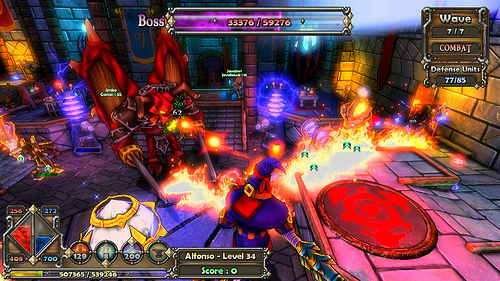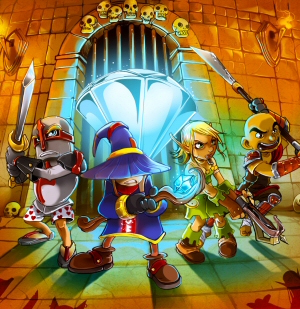Since the beginning of video gaming, entertainment software has been attached to certain platforms, whether its been arcade cabinets, home console devices or consumer personal computers. The omnipresence of the Internet, however, has led to a rise in cloud services that allows cross-platform functionality like never before. This extends to gaming, with game streaming possible and the ability to play across multiple disparate platforms now a reality. We talked with GameSpy Technology Marketing Director Sean Flinn about his company’s cross-platform middleware, along with Trendy Entertainment’s COO and co-founder Jeremy Stieglitz and Marketing Director Philip Asher about their title Dungeon Defenders, which will soon be available for several modern platforms.
Talk to me a little bit about how the partnership came about in the first place.
Jeremy Stieglitz: When we first started with Dungeon Defenders, we knew we wanted online multiplayer with matchmaking and we knew we wanted to be on multiple platforms and didn’t want separate networks. While Xbox takes care of itself, there’s still iOS, Android, PS3 and PC and we couldn’t even consider developing for all those platforms separately. At first, we didn’t consider the cross-platform abilities of GameSpy, we just wanted a low hassle way to incorporate online play. We use Unreal Engine 3, so it was pretty drag-and-drop for our game with our three man tech team. We thought of enabling cross platform-play when we realized there really were no barriers to doing it and it was implemented easily after we integrated it with the game.
Sean Flinn: They came through our GameSpy Open program which is available for all platforms for free. It really stood out because they asked questions about Android ahead of where it was on our internal roadmap. We knew they were pushing the technology and that was exciting to us. [GameSpy technology has] been cross-platform enabled for quite a while – you go back to the Dreamcast, we implemented cross-platform play for 4×4 Evo. It really lived up to expectations that we had and it’s great to work with the guys that we think are on the tip of the spear as far as cross platform technology that studios are reluctant to try. That bet paid off, with something people have dreamed of.
 Dungeon Defenders in action.
Dungeon Defenders in action.
Speaking of cross-platform play, Quake III had some issues with Dreamcast players not being able to match the precise control that PC users had with the mouse and keyboard [not implemented by GameSpy but by id. -ed.]. How do you deal with different input methods?
Jeremy Stieglitz: With Dungeon Defenders, there are three control schemes; there’s touch, gamepad and mouse/keyboard, so we had to come up with a design to keep it consistent between the platforms. The idea we had was that [the users] wouldn’t know who was using what format and it wouldn’t matter. So we came up with net instructions that would abstract out what was sent over the network; it’s not the raw value of the input. So with that, we kept the functionality consistent and we developed our games for that method, otherwise every game would have to do that differently.
I’d also like to add that having auto-aim helped us greatly on mobile and console! Another big advantage [for Dungeon Defenders] is having a focus on co-op play. One of the biggest advantages for cross platform in co-op is that you don’t have to worry about someone having a competitive advantage; there is competitive multiplayer but it’s not the primary way to play the game.
Talk to me about the reception at PAX Dev.
Philip Asher: It was received really well, and it was standing room only while we were presenting. People wanted to know how to integrate multiple platform support into their games. We got a huge boost and a lot of people were coming up and asking if they could play with friends on other platforms. We had a live demo of the technology, with people playing on a PS3, PC, an iPad and an Android phone that really got a good reception.
Who won among the platforms?
Philip Asher: It was a co-op session, so technically everyone won!
Did fans give positive feedback have for Dungeon Defenders at PAX?
Philip Asher: We definitely did. People liked to see technical wizardry. There’s a big difference between hearing about something and seeing it actually happen, so it provided a big boost for us.
Jeremy Stieglitz: One of the advantages is the large fanbase on Android and iOS. We have over a million users, and it’s been helpful to roll those players over to the PC and PS3 so even though Dungeon Defenders hasn’t launched on those platforms, we already have an active player base.
 The Dungeon Defenders.
The Dungeon Defenders.
For GameSpy, talk to me about what you feel like you offer to indie operators.
Sean Flinn: I think the great thing is that we don’t offer them anything different from AAA developers, like what Nintendo and Take-Two, have. We offer the technology free-of-charge for those that are getting their feet underneath them. We do have plans to monetize the services down the line, but they’ll be affordable.
Jeremy Stieglitz: A really key factor was the technology was easy to use; if it hadn’t been workable out of the box, it would not of been viable for us. It was very straightforward for us and we didn’t have to bang our heads against the wall and the Unreal Engine 3 integration made it easier for us.
Sean Flinn: Using our low price point-of-entry, those interested can download [the technology] directly from the website and ask questions in the forums without jumping through hoops — it’s very much initiated by the developers. We just released a new version of our tech, so Unity developers will see improved ease of access to what they’re doing.
Talk with me about the exciting potential for cross-platform development with GameSpy Technology.
Sean Flinn: Cross-platform is something we have more plans to expand on. We understand why [developers] don’t do it; different platforms can make it intimidating to migrate. They realize gamers aren’t tied to one platform; they want to transcend platforms. They want to play on multiple versions of the same game; leave off on mobile and play on PC and finish on PC and play on console. Sometimes you want to play across platforms and it’s the way players play today. The trend is towards “games as services” and enabling players to vault those platform gaps is great and we’re glad we’re helping people share experiences especially as mobile platforms mature. There’s also cloud based saving and stats tracking, which is all in our tech.
Philip Asher: We agree with what Sean has said about the benefit from having a userbase together online as opposed to multiple separate platforms. A PC gamer can play with a mobile gamer and that just expands the overall player network.
Do you think we’re heading towards a future where format either matters very little or not at all?
Jeremy Stieglitz: Definitely. Games as service has been a trend over the past year or so and is a continuing trend and a big part of that is cross-platform play and cloud gaming. In terms of the games themselves, it is a good thing for indie developers because it decreases monopoly players. We don’t want to interrupt [users’] play and it creates a userbase that transcends platform and that increases the total number of potential players to ALL players everywhere, not just who owns an Xbox or PS3.
We think the trend is towards more mobile development and not less. It’s going to get easier and easier to make more and higher quality games. That’s coupled with a rise in capabilities to deliver enhanced games and the acknowledgment that not every game has to be Call of Duty. The quality of games from indies is equivalent to what you’re getting from AAA studios. There’s a realization that fun doesn’t have to be equivalent to the price tag.
This is a trend that is not going to just benefit developers but gamers as well and I think the platforms that don’t adapt . . . players will play them less and less. I think it’s smart for Sony to cooperate with the cross-platform design; we feel the trend is towards enabling cross-platform play.
It’s like with the mobile MMO Pocket Legends that works across iOS, Android and soon on PC — once you have that convenience you’re not going to want to go back.
Sean Flinn: One of the mottoes we have is games are designed to be played with other people. PC gaming and video gaming spent a little while in the single-player space but people in the 70s and 80s remember that most games were originally designed to be played around other people [in the arcade]. As evidenced by the rise of FPS deathmatch in the ’90s, anyone who gets into multiplayer there’s really no going back and what Dungeon Defenders has done is extended it to cross-platform players and struck down these barriers, allowing people to have more fun.
Seems like it’s a good time to be a developer working for yourself.
Jeremy Stieglitz: It’s a good time to be an indie. I think traditionally, monopolies stayed with large platforms, but this is a large opportunity to have a player-based markets.
So will cross-platform play be enabled on release?
Jeremy Stieglitz: We hope to have cross-platform play on release if not shortly thereafter. Its difficult to release things super synchronously. The only thing tricky about this is we have to do a mobile update through mobile certification and go through iOS approval. So the idea is to have it on the first day, but there’s a lot of moving parts.
Anything that you’d like to add?
Jeremy Stieglitz: Game is out on October 19, 2011 for Xbox Live Arcade and PC!
Thanks everyone!
_ _
Played Dungeon Defenders on Android or iOS Looking forward to it coming to home platforms Join the discussion on Facebook.

